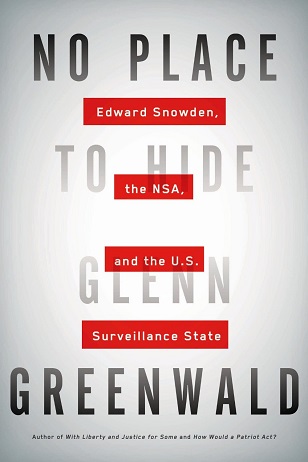Glenn Greenwald discloses a riveting account of his role in bringing Edward Snowden’s deeply troubling revelations about the NSA to the attention of the public. You can order Greenwald’s new book, No Place to Hide: Edward Snowden, the NSA, and the U.S. Surveillance State directly from Truthout by clicking here. Your contribution helps get the truth out.
Glenn Greenwald has just released a new 350-page book recompiling the ongoing saga of the “tens of thousands” of secret NSA documents given to him by whistleblower Edward Snowden. Entitled No Place to Hide, the book describes what Greenwald calls “a surveillance system that has as its primary objective the elimination of privacy globally, by which I mean that everyone’s communications electronically will be collected, stored, analyzed and monitored by the US government.”
Greenwald – whose training as a lawyer and litigator make his arguments sound like they are expounded before a jury – is not naive to the security threats of the post-Cold War era. Instead, he posits a fundamental American core value: Innocent until proven guilty.
“The alternative to mass surveillance is not the complete elimination of surveillance. It is, instead, targeted surveillance, aimed only at those for whom there is substantial evidence to believe they are engaged in real wrongdoing,” he writes. “I think it [Snowden affair] will be seen as the moment that the United States showed its true face to the world in terms of attacks on journalism and their desire to punish anyone who brings transparency.”
Judging from Greenwald’s first-person account, Snowden radiated a calm and orderly logic that were essential parts of his psychological makeup. It was a combination that made him both the NSA’s up-and-coming star and its ongoing nightmare. Throughout their first adrenaline-pounding days of covering Snowden’s revelations, Greenwald and the other journalists could hardly slow down. Snowden meanwhile ended the day saying he needed to rest and joking, “I call the bottom bunk at GITMO [Guantanamo].” Asked why he could sleep so well, Snowden quipped, “I figure I have very few days left with a comfortable pillow, so I might as well enjoy them.”
Snowden’s defense of Internet freedom comes across in Greenwald’s book as both theoretical and experiential. “Basically the internet allowed me to experience freedom and explore my full capacity as a human being,” Snowden tells Greenwald. “For many kids, the Internet is a means of self-actualization. It allows them to explore who they are and who they want to be, but that only works if we’re able to be private and anonymous, to make mistakes without them following us. I worry that mine was the last generation to enjoy that freedom.”
The most powerful sections of Greenwald’s book are not the individual documents, but those that dwell on the connivance of corporate America. The subservient role of Fortune 500 Corporations, especially Microsoft, allows a rare glimpse into the unspoken conspiracies that may never be written or seen, but are felt by all. Microsoft, writes Greenwald, spent months redesigning software to facilitate penetration by NSA spies.
Snowden, meanwhile, is depicted as a wise aesthetic, a man willing to go down on the sword. “I could not do this without accepting the risk of prison. You can’t come up against the world’s most powerful intelligence agencies and not accept the risk,” Snowden tells Greenwald. “If they want to get you, over time, they will.” Usually such dire predictions are dismissed as paranoid rants. In this case, they are level-headed analysis by a former top US intelligence operative.
It is true, as Greenwald notes, that the Snowden revelations triggered a “global debate about the value of individual privacy in the digital age and prompted challenges to America’s hegemonic control over the internet.” But how much of the dirty, nitty-gritty detail will stick?
The Snowden documents highlight an unprecedented sabotage of internet privacy. In operation after operation, the documents shows US officials lurching from one technical challenge to another, never asking “Should we?” and obsessing with “Getting it all.” Referring to US intelligence, Snowden states “We hack everyone everywhere. We like to make a distinction between us and the others. But we are in almost every country in the world. We are not at war with these countries.”
The damage to human creativity, the subversion of personal privacy and the overall betrayal of human rights from such intrusive spying will never fully be calculated. But even the small fraction of the Snowden papers thus far made public have shown that our intrinsic need to communicate, to share, to blog/tweet/upload has ushered in a radical new balance of power. Whether Snowden has stopped the forces of surveillance, merely slowed them or allowed them to hone their tools has yet to be decided. In No Place to Hide, Glenn Greenwald makes a persuasive case that it is a battle that has engulfed us all.
3 Days Left: All gifts to Truthout now matched!
From now until the end of the year, all donations to Truthout will be matched dollar for dollar up to $38,000! Thanks to a generous supporter, your one-time gift today will be matched immediately. As well, your monthly donation will be matched for the whole first year, doubling your impact.
We have just 3 days left to raise $38,000 and receive the full match.
This matching gift comes at a critical time. As Trump attempts to silence dissenting voices and oppositional nonprofits, reader support is our best defense against the right-wing agenda.
Help Truthout confront Trump’s fascism in 2026, and have your donation matched now!
